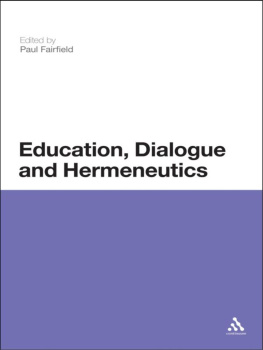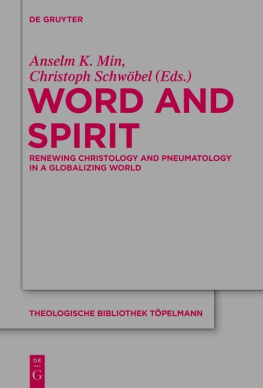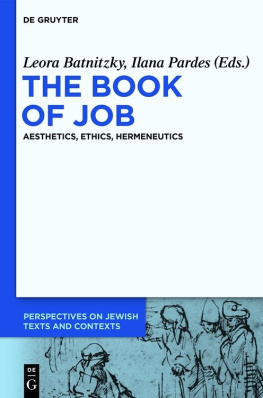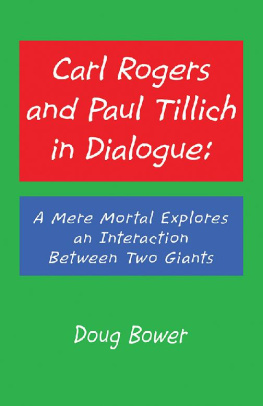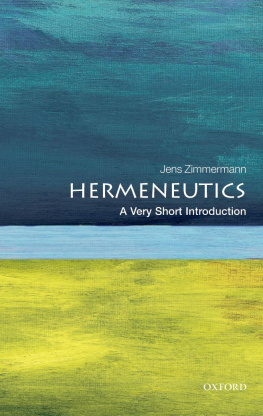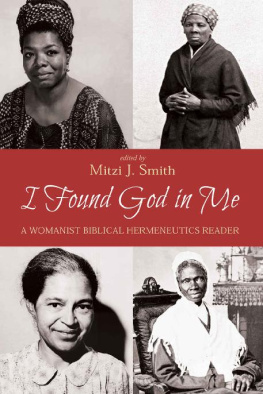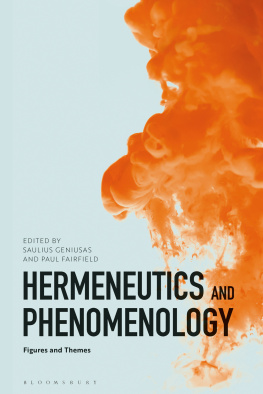Paul Fairfield (editor) - Education, Dialogue and Hermeneutics
Here you can read online Paul Fairfield (editor) - Education, Dialogue and Hermeneutics full text of the book (entire story) in english for free. Download pdf and epub, get meaning, cover and reviews about this ebook. year: 2019, publisher: Continuum, genre: Religion. Description of the work, (preface) as well as reviews are available. Best literature library LitArk.com created for fans of good reading and offers a wide selection of genres:
Romance novel
Science fiction
Adventure
Detective
Science
History
Home and family
Prose
Art
Politics
Computer
Non-fiction
Religion
Business
Children
Humor
Choose a favorite category and find really read worthwhile books. Enjoy immersion in the world of imagination, feel the emotions of the characters or learn something new for yourself, make an fascinating discovery.
- Book:Education, Dialogue and Hermeneutics
- Author:
- Publisher:Continuum
- Genre:
- Year:2019
- Rating:3 / 5
- Favourites:Add to favourites
- Your mark:
- 60
- 1
- 2
- 3
- 4
- 5
Education, Dialogue and Hermeneutics: summary, description and annotation
We offer to read an annotation, description, summary or preface (depends on what the author of the book "Education, Dialogue and Hermeneutics" wrote himself). If you haven't found the necessary information about the book — write in the comments, we will try to find it.
Education, Dialogue and Hermeneutics — read online for free the complete book (whole text) full work
Below is the text of the book, divided by pages. System saving the place of the last page read, allows you to conveniently read the book "Education, Dialogue and Hermeneutics" online for free, without having to search again every time where you left off. Put a bookmark, and you can go to the page where you finished reading at any time.
Font size:
Interval:
Bookmark:

Education, Dialogue and Hermeneutics
Also available from Continuum
Philosophy of Education, Richard Pring
Theory and Practice of Education, David A. Turner
Education After Dewey, Paul Fairfield
Education, Dialogue and
Hermeneutics
Edited by
Paul Fairfield

Continuum International Publishing Group
A Bloomsbury company
50 Badford Square London WC1B 3DP
80 Maiden Lane Suite 704 New York, NY 10038
www.continuumbooks.com
Paul Fairfield and contributors 2011
First edition Published 2011
Paperback edition Published 2012
All rights reserved. No part of this publication may be reproduced or transmitted in any form or by any means, electronic or mechanical, including photocopying, recording, or any information storage or retrieval system, without prior permission in writing from the publishers.
British Library Cataloguing-in-Publication Data
A catalogue record for this book is available from the British Library.
ISBN: 978-1-4411-7343-0
Library of Congress Cataloging-in-Publication Data
Education, dialogue and hermeneutics / edited by Paul Fairfield.
p. cm.
Includes bibliographical references.
ISBN: 978-1-4411-8321-7 (hardcover)
1. Education--Philosophy. 2. Education--Research. 3. Communication in education. 4. Hermeneutics. I. Fairfield, Paul, 1966 II. Title.
LB14.7.E392 2010
370.1dc22
2010016142
For Gwyneth Fairfield
Contents
|
|
|
|
|
|
|
|
|
Notes on Contributors
Babette Babich is professor of philosophy at Fordham University and executive editor of New Nietzsche Studies. Her recent works include Words in Blood, Like Flowers (2006), Nietzsche, Habermas, and Critical Theory (edited volume, 2004), and numerous articles on Nietzsche, Heidegger, and Hlderlin.
Nicholas Davey is professor of philosophy at the University of Dundee. He is the author of Seeing Otherwise (forthcoming), Unquiet Understanding (2006), and numerous articles on hermeneutics, aesthetics, and Nietzsche.
Paul Fairfield is associate professor of philosophy at Queens University. His recent books include Philosophical Hermeneutics Reinterpreted (2011) and Education After Dewey (2009). He is former editor of Symposium: Canadian Journal of Continental Philosophy.
Shaun Gallagher is professor of philosophy and cognitive sciences at the University of Central Florida. He is editor of Phenomenology and the Cognitive Sciences and author of Brainstorming (2008), Hermeneutics and Education (1992), and numerous works in the philosophy of mind, phenomenology, and hermeneutics.
Jean Grondin is professor of philosophy at Universit de Montral and adjunct professor at the University of Ottawa. He is the author of several books on hermeneutics, including Hans-Georg Gadamer: A Biography (2003) and Introduction to Philosophical Hermeneutics (1997).
Graeme Nicholson is professor emeritus of philosophy at the University of Toronto. He has authored numerous works in hermeneutics and ontology, including Justifying Our Existence (2009), Illustrations of Being (1997), and Hans-Georg Gadamer on Education, Poetry, and History (edited volume, 1992).
Ramsey Eric Ramsey is associate professor of social and behavioral sciences at Arizona State University. He is coauthor of Leaving Us to Wonder (2005) and author of The Long Path to Nearness (1987) and other works in the philosophy of science and communication.
Andrzej Wiercinski is president and founder of the International Institute for Hermeneutics. His edited volumes include Hermeneutics and the Art of Conversation (forthcoming), Phronetic Rationality (forthcoming), and Between Suspicion and Sympathy (2003).
Introduction
Education, Dialogue and Hermeneutics
Paul Fairfield
What is decisive in education may well be the most elusive to reflection. We turn to the theory of education in order to clarify and gain critical perspective on the practice, but when the practical business of teaching and learning is not only complex but exceedingly so, clarity can be far to seek, not least because the matter of which we are speaking is at once tangible and intangible. There are dimensions of education, we commonly believe, that are empirical, technical, and utilitarian. None would contest that in education we are imparting information and skills whose use-value in the world is unquestionable. Teachers are charged with the practical tasks of covering the material, instilling a curriculum, and preparing students for examinations, perhaps by means of a technique that is efficient and which can be expected to secure measurable outcomes. Rather often, however, educators have upheld an additional view that coexists uneasily with the first. This is that there is more to education than what can be spoken of within an empirical, technical, and utilitarian vocabulary, and perhaps a great deal more. When we are speaking of intangibles, a discourse that is tied too closely to the empirical can miss a good deal of the point of education and compress the whole business into a theoretical model that omits what is decisive. Educators in all disciplines and at all levels require some basic orientation that transcends the immediate business of transmitting knowledge, yet when one turns to the educational literature one finds an array of approaches, methods, and disciplinary vocabularies the relations between which are often as unclear as their relevance for practice. What follows, one might ask, from the latest findings in educational psychology in the real world of education? What difference does it make, one might also ask, whether we are critical theorists, progressives, or poststructuralists in the classroom? The relevance of theory to practice must be evident, but as anyone who has waded into this literature can attest, this is not always the case.
If the implications of educational theory for what actually happens, or might happen, in classrooms are not always clear, a further problem is that a good deal of our theorizing has a narrowing effect on how we think about education. Theoretical reflection in general aims to clarify its object, yet the clarity that we seek must not be purchased at the cost of oversimplification or any reduction in the complexity of the things themselves. When we insist that education, and educational research, be brought within a framework of utility and scientificity we run the risk of misunderstanding through oversimplification. If the practice of education is variable and intangible, at least in part and particularly in its higher reaches, our theorizing must reflect this fact and not insist that the phenomena be made to fit a model imported from the sciences. Without doubt, a good part of education lends itself to quantitative, empirical, and utilitarian analysis, yet a good part of it also does not.
Font size:
Interval:
Bookmark:
Similar books «Education, Dialogue and Hermeneutics»
Look at similar books to Education, Dialogue and Hermeneutics. We have selected literature similar in name and meaning in the hope of providing readers with more options to find new, interesting, not yet read works.
Discussion, reviews of the book Education, Dialogue and Hermeneutics and just readers' own opinions. Leave your comments, write what you think about the work, its meaning or the main characters. Specify what exactly you liked and what you didn't like, and why you think so.

